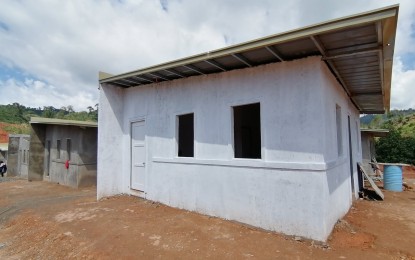
HOUSING PLANS. A total of 438 housing units are being built in Barangay Patani, Marawi City. The Department of Human Settlements and Urban Development said in a statement on Sunday (April 18, 2021) that more projects for low-income families will be available under the Inclusive Green Housing Microfinance program. (Photo courtesy of DHSUD Facebook)
MANILA – The Department of Human Settlements and Urban Development (DHSUD) is pushing for a housing microfinance strategy that will grant low-income families access to climate-resilient homes at affordable costs.
Secretary Eduardo del Rosario said DHSUD will hold consultation meetings and workshops with financial institutions, private developers, and other stakeholders to establish the Inclusive Green Housing Microfinance (IGHM) program.
"With the high price of land, especially in urban areas, affordability remains a major stumbling block to homeownership for many Filipinos who fall below the poverty line," del Rosario said in a statement Sunday.
A total of 6 virtual meetings are scheduled between April and May this year. It will involve the formulation of frameworks and the creation of long-term targets for the rollout of IGHM.
"The department is committed to finding alternative means such as housing microfinance to help them afford their dream homes,” del Rosario said.
The agenda for the consultation meetings include a discussion of major findings from the assessment of existing housing microfinance programs.
The meetings will assess the operations of existing housing microfinance programs nationwide, identify and address challenges related to housing microfinance, and analysis of green housing features.
“We are reaching out to our stakeholders, especially the microfinance institutions that are already implementing housing microfinance in the communities to gather insight, capture best practices, and ease barriers for an effective nationwide implementation,” del Rosario said.
These microfinance institutions include Microfinance Council of the Philippines and Alliance of Philippine Partners in Enterprise Development, ASA Philippines Foundation, Kasagana-Ka Cooperative, and Habitat for Humanity.
DHSUD will also meet with developer groups such as the Organization of Socialized and Economic Housing Developers of the Philippines and Socialized Housing Developers Association, and key shelter agency Social Housing Finance Corporation and Bangko Sentral ng Pilipinas Center for Learning and Inclusion Advocacy.
The IGHM program is aligned with the 2021 agenda of the National Human Settlements Board, a multiagency housing body chaired by the DHSUD that focuses on the pursuit of policy reforms to accelerate housing microfinance as a primary pro-poor housing finance strategy in recognition of the need to provide alternative housing solutions to low-income households. (PNA)
